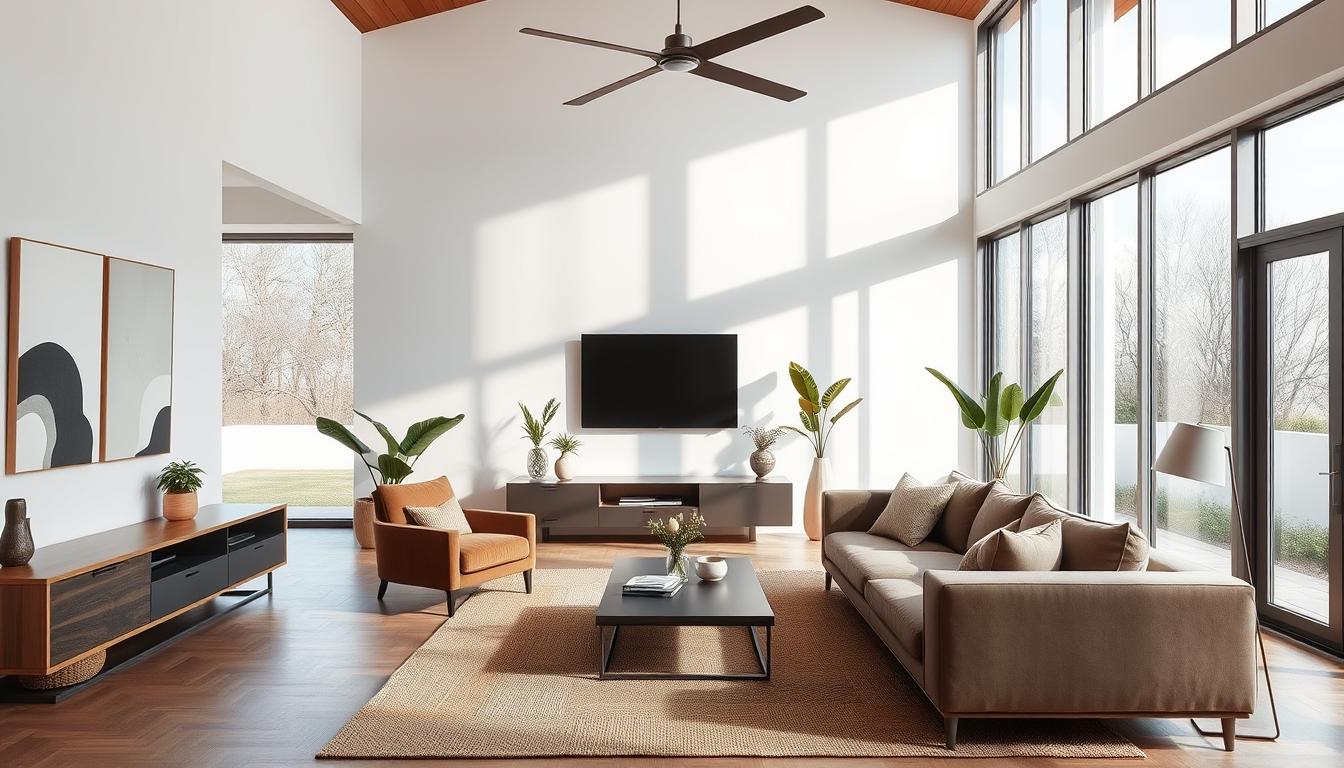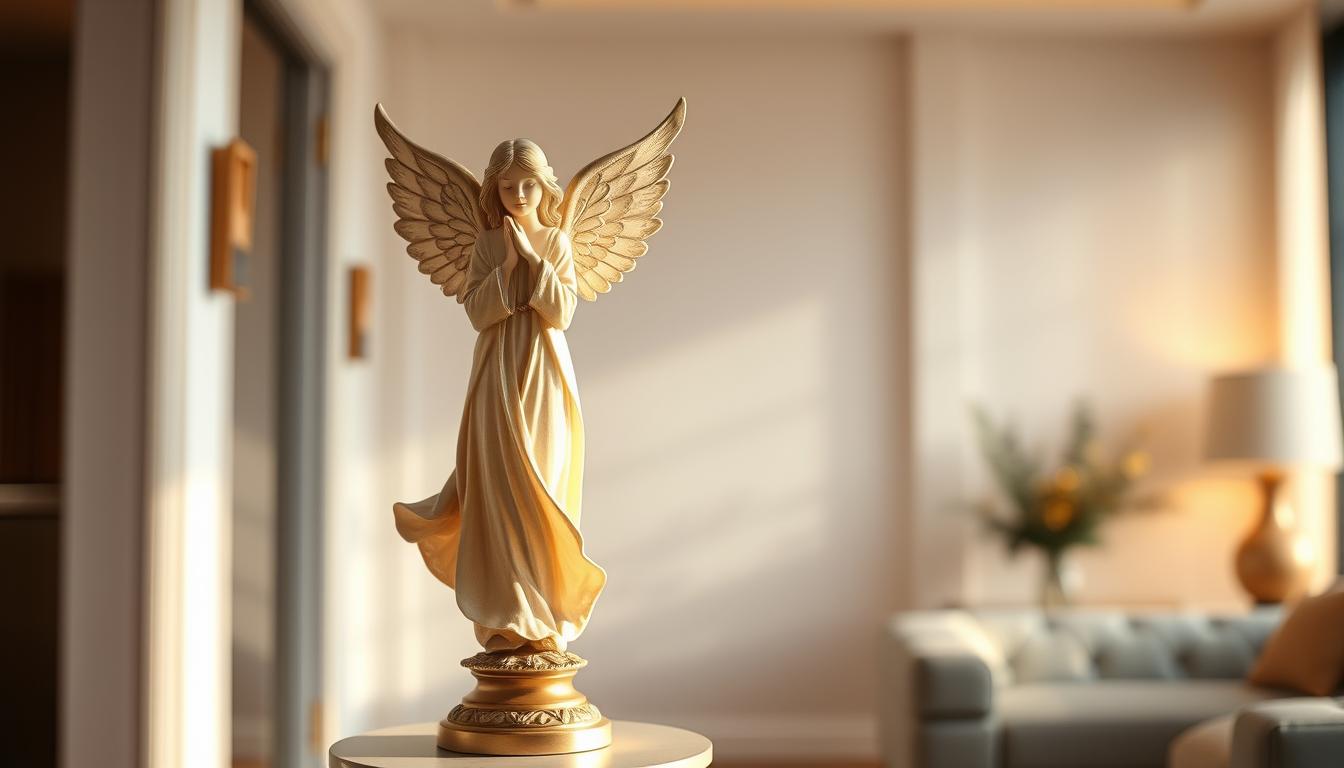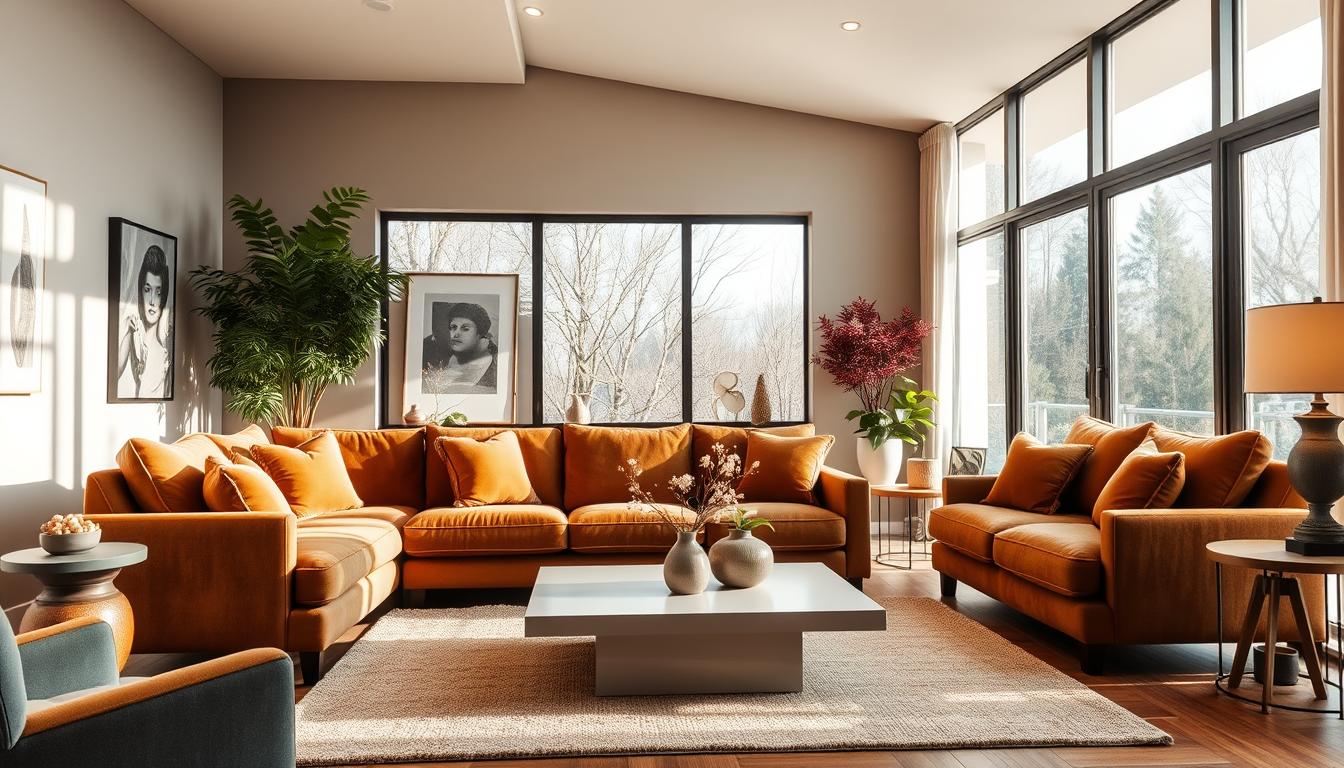Creating a stylish space is a journey, not a destination. As we explore the world of modern home design, we’re constantly inspired by the latest interior decoration ideas. These ideas transform a house into a home.
We’ve gathered valuable insights from top interior designers. They share their knowledge of home design interior. Finding your unique style takes time and patience. It’s important to trust the process and enjoy the journey.
Key Takeaways
- Explore different interior decoration ideas to find your unique style
- Trust the process and be patient when creating your stylish space
- Incorporate modern home design trends to stay up-to-date
- Consider the latest interior design trends when making decisions
- Enjoy the journey of transforming your house into a home
Understanding Our Style Preferences
Our home’s look shows who we are. To make it truly ours, we must know what we like. This means looking into what shapes our design choices and finding our unique style.
Defining Our Aesthetic
Figuring out our aesthetic means spotting what we love in interior design trends. Maybe we like modern’s clean lines or traditional’s cozy feel. By seeing these patterns, we can create a look that shows our taste. For example, loving luxury interior design might mean adding high-end materials and elegant styles.
Exploring our likes is easier with home decor inspiration from many places. This could be from design magazines, online, or nature. Collecting images or items that speak to us helps us find common themes, like favorite colors or textures.
Influences on Our Design Choices
Many things shape our design choices, like our culture, experiences, and interior design trends. For instance, a family heirloom might inspire a style or color. Or, a trip might introduce us to new textures and patterns. Knowing these influences helps us choose wisely, staying true to our style.
Also, wanting luxury interior design might push us to pick high-quality, eye-catching pieces. These pieces not only show our style but also make our space better. By mixing our personal taste with these influences, we can make a home that’s both stylish and meaningful.
In short, knowing our style preferences is key to making a home that’s truly ours. By defining our aesthetic and understanding what shapes our choices, we can create a space that’s beautiful and reflects who we are.
Choosing the Right Color Palette
Choosing the right colors is key in home design. The colors we pick can change how our living space feels. It can make it feel welcoming, calm, or lively.
Color Psychology in Home Design
Color psychology is very important in home design. Different colors can make us feel different ways. For example, blue tones are often associated with feelings of serenity and tranquility, making them great for bedrooms. On the other hand, warm colors like orange and red can stimulate conversation and energy, perfect for living areas.
Knowing how colors affect us can help us choose better. We should also think about the natural light in our space. It can change how colors look during the day.
Pairing Colors for Harmony
It’s important to pair colors well to make our home look good. The 60-30-10 rule is a good way to do this. It means 60% of the room is one color, 30% another, and 10% an accent color. This balance helps our space look balanced, even in small areas.
| Color Scheme | Description | Ideal for |
|---|---|---|
| Monochromatic | Using different shades of the same color | Contemporary home interiors |
| Complementary | Pairing colors opposite each other on the color wheel | Creating contrast in DIY home decor |
| Analogous | Using colors next to each other on the color wheel | Creating a smooth transition between colors |
By using these tips and thinking about color psychology, we can pick colors that show our style. They can also make our home feel better.
Selecting Quality Materials
The materials we choose for our homes greatly affect their look and how long they last. When picking materials, we must think about our style. This could be Scandinavian interior design simplicity or luxury interior design opulence.
Durability Meets Design
It’s important to balance durability and design when picking materials. Durable materials save us from having to replace them often. This saves resources and cuts down on waste.
For example, hardwood flooring is both beautiful and long-lasting. It’s a favorite in many homes, both modern and traditional.
Design is also key in choosing materials. It greatly affects how our spaces look. Materials like reclaimed wood, eco-friendly textiles, and sleek metals can make our interiors stand out.
Using reclaimed wood in furniture or decor adds warmth and character. This is a big part of Scandinavian interior design.
Sustainable Choices for a Greener Tomorrow
More people are choosing sustainable materials for their homes. These materials are good for the environment. They’re sourced and processed in ways that harm the planet less.
- Bamboo flooring is highly renewable and durable.
- Recycled glass countertops offer a unique aesthetic while reducing waste.
- Low-VOC paints improve indoor air quality.
Choosing sustainable materials helps our planet and makes our homes healthier. This is key in luxury interior design, where high-end materials are used to create sophisticated, eco-friendly spaces.
In conclusion, picking quality materials means balancing durability, design, and sustainability. By making smart choices, we can create homes that are beautiful, functional, and good for the environment. These homes reflect our personal style and values.
Maximizing Space Utilization
It’s key to make the most of our space to have a cozy and stylish home. By using our space well, we get a living area that’s both comfy and looks great.
Open Floor Plans vs. Defined Spaces
Choosing between an open floor plan or defined spaces is a big decision. Open floor plans make our homes feel bigger and are perfect for contemporary home interiors. They let us move easily between areas. Yet, defined spaces help us have separate spots for different activities, making our home more functional.
For more ideas on small space design, check out House Beautiful’s small space design ideas.
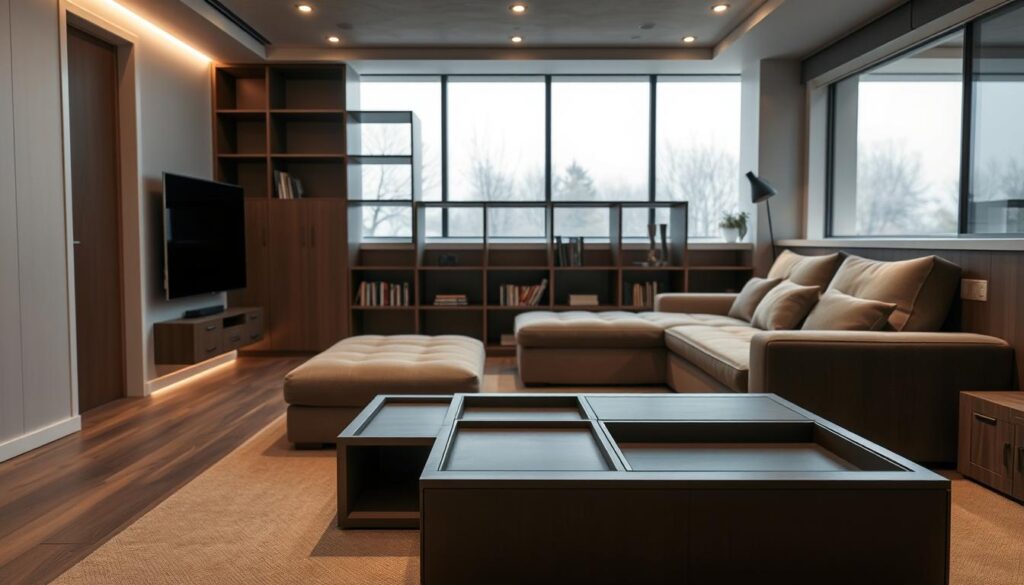
Clever Storage Solutions
Smart storage is vital for maximizing space utilization. Using furniture that does double duty and hidden storage keeps our stuff tidy and out of sight. This not only cuts down on clutter but also makes our home feel more relaxed and organized.
For expert advice on interior decoration, think about getting help from interior design services.
Some great storage ideas include wall-mounted shelves, furniture with built-in storage, and under-bed containers. By using these interior decoration ideas, we can make our homes both functional and stylish.
Lighting: The Heart of Interior Design
In interior design, lighting is key to setting the mood of a space. Good lighting makes our homes look better and feel more inviting.
“Lighting is a crucial element that can significantly impact the ambiance of a room,” as noted by interior design experts. It’s not just about light; it’s about creating a vibe that shows our style.
Natural Light vs. Artificial Light
We have two main types of lighting: natural and artificial. Natural light is great because it’s energy-saving and adds warmth. Artificial light lets us light up our homes anytime, no matter the weather.
For home decor inspiration, think about using natural light well. Use sheer curtains or mirrors to reflect sunlight. But, artificial lighting can also create a cozy feel when natural light is low.
Types of Lighting Fixtures
The lighting fixture we pick can really change our space’s look. From luxury interior design like crystal chandeliers to DIY home decor like mason jar pendant lights, there’s a lot to choose from.
- Table lamps and floor lamps add elegance and task lighting.
- Pendant lights are great for kitchen islands or dining areas, blending function and style.
- Recessed lighting gives a clean, minimalist look while lighting up the room.
By picking and mixing different lighting fixtures, we can get a layered lighting effect. This makes our home both functional and beautiful.
Furniture Selection: Finding the Perfect Fit
Finding the right furniture is key to a room’s feel. It’s not just about picking pieces; it’s about creating a space that shows our style and meets our needs.
To make a living space work well, we need to think about a few things. We must pick furniture that fits right and choose pieces that do more than one thing.
Scale and Proportion in Furniture
Furniture that’s the right size for the room is essential. Too big and a room feels small, too small and it feels empty. We must measure our rooms well and pick furniture that fits well.
For more tips on picking furniture, check out Furniture Selection 101: How to Choose the Right Pieces for Your Home. It offers great advice on making smart choices.
| Furniture Piece | Ideal Scale | Considerations |
|---|---|---|
| Sofa | Proportional to the room size | Think about how many people will use it and the room’s layout |
| Coffee Table | Lower than the sofa arm height | Make sure it doesn’t block movement |
| TV Stand | Proportional to the TV size | Think about where you’ll put media devices and accessories |
Multi-functional Furniture Options
In today’s homes, furniture that does more is a big plus, even in small spaces. Things like storage ottomans and sleeper sofas save space and keep things tidy. They’re useful and help keep our homes neat.
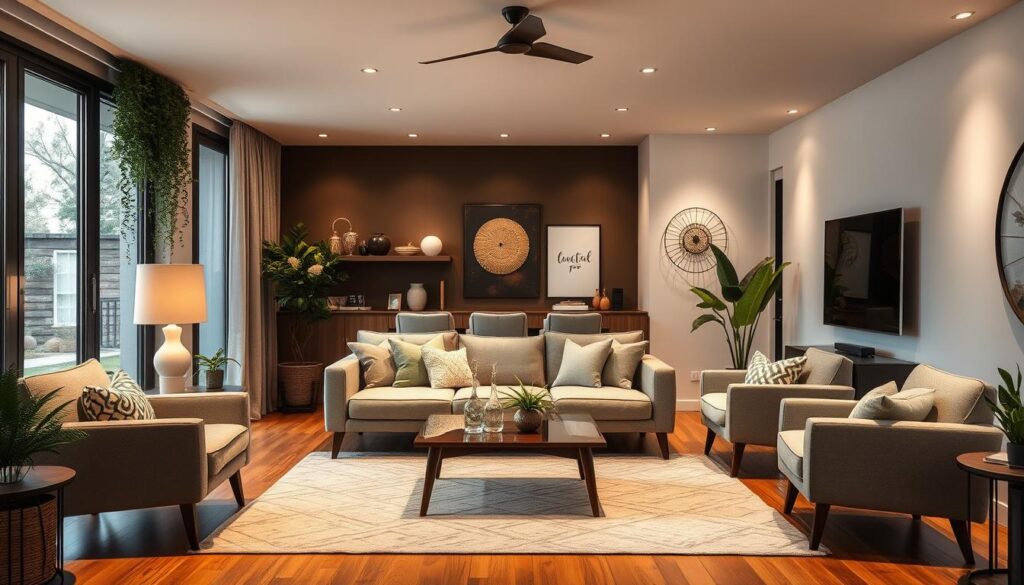
When picking multi-functional furniture, think about how you live. For example, a storage ottoman can be a footrest and a place to store things.
By choosing furniture that fits well and does more, we can make a space that looks good and works well. It’s stylish, functional, and comfy.
Accessorizing with Purpose
To make a space stylish and welcoming, we need to choose items with care. We should pick artwork and textiles that show our style and enhance the room’s look.
Choosing Artwork That Speaks to Us
When picking artwork, look for pieces that mean something to you. They should make the room feel cozy. Art can be a big source of home decor inspiration, letting us share our unique tastes.
For those who love DIY home decor, making your own art is rewarding. You can frame photos, create abstract pieces, or make decorative items by hand.
The Importance of Textiles
Textiles are key in interior design, bringing warmth, texture, and personality. They include throw pillows, blankets, rugs, and upholstery. These items offer many chances for luxury interior design and creativity.
Let’s look at how different textiles change a room’s look:
| Textile | Effect on Room | Best Used In |
|---|---|---|
| Velvet | Luxurious feel, adds depth | Living rooms, bedrooms |
| Linen | Light, airy, natural look | Coastal, minimalist spaces |
| Wool | Warm, cozy, durable | Rustic, traditional decor |
By carefully choosing artwork and textiles, we can make a space that’s not just pretty but also personal. Whether we prefer DIY home decor or luxury interior design, our choices should match our lifestyle and taste.
Creating Focal Points in Each Room
In today’s homes, focal points are key to making a room look great. A focal point grabs your attention and becomes the room’s main attraction. It could be a standout piece of furniture, a bold art piece, or a unique architectural feature. We’ll look at how to make and balance these focal points in our homes.
Using Statement Pieces Effectively
Statement pieces are essential for creating a focal point. Bold artwork or eye-catching furniture can be a great choice. When picking a statement piece, think about its size and how it fits in the room. A big piece in a small room can feel too much, while a small piece in a big room might get lost.
We should pick a piece that stands out but doesn’t take over the room.
Balancing Visual Interest
To balance visual interest, mix different textures, colors, and patterns. This adds depth and beauty to the space. We can mix smooth and rough textures, or bold patterns with solid colors. The goal is to create a space that’s interesting but not too busy.
For example, if a room has a bold focal point, we can use calmer colors on walls and furniture. This contrast makes the space feel balanced and engaging. Adding plants or natural elements can also warm up the room and make it look better.
Incorporating Indoor Plants
Adding indoor plants to our homes is a smart DIY idea. They bring natural beauty and make our living spaces healthier.
Air Purification and Stress Reduction
Indoor plants clean the air by removing harmful substances. They also help reduce stress by making our homes feel calm.
Benefits of Indoor Plants:
- Improve air quality
- Reduce stress
- Add aesthetic appeal
- Boost mood
Best Plants for Home Interiors
Choosing the right plants for our homes is important. We should pick ones that are easy to care for. Succulents, air plants, and peace lilies are great options.
| Plant Type | Maintenance Level | Benefits |
|---|---|---|
| Succulents | Low | Water storage, unique designs |
| Air Plants | Low | No soil required, versatile |
| Peace Lilies | Medium | Air purification, elegant white blooms |
Using these plants in our decor makes our homes look better. It also fits with Scandinavian design, which values simplicity and nature.
Personalizing Our Space
Personalizing our living space is more than looks. It’s about adding personal touches that tell our story. When we include items that hold special meaning, our home feels uniquely ours.
Adding personal items to our home design makes it more inviting. One great way is by using family heirlooms in our decor.
Incorporating Family Heirlooms
Family heirlooms are more than old items; they connect us to our past. Displaying them in our homes adds depth and history. For example, an antique vase or vintage furniture can make a room elegant and sophisticated.
To use family heirlooms in our luxury interior design, we should:
| Heirloom Type | Display Idea | Design Impact |
|---|---|---|
| Antique Furniture | Centerpiece in a living room | Adds historical significance and elegance |
| Vintage Jewelry | Displayed in a glass case | Creates a personal and unique decorative element |
| Family Artwork | Prominently hung in a hallway | Enhances the aesthetic with personal heritage |
Creating a Gallery Wall
Creating a gallery wall is another way to personalize our space. It involves choosing frames for personal photos, artwork, or meaningful items. A well-made gallery wall can be a room’s centerpiece, adding interest and telling our life stories.
To make an impactful gallery wall, consider these ideas:
- Mix and match frame styles and sizes for a dynamic display.
- Use a unifying element, like a color scheme or material, to connect the frames.
- Balance the arrangement to distribute visual weight evenly.
By adding family heirlooms and creating a gallery wall, we make our home beautiful and personal. These elements reflect our personality, experiences, and values. This makes our house truly feel like home.
Trends vs. Timelessness in Interior Design
Finding a balance between trendy and timeless is key in interior design. We aim for our homes to look modern yet last forever.
Classic design elements like neutral colors and durable furniture are lasting trends. They help our homes feel consistent and make it easy to add trendy touches.
Enduring Design Elements
We must choose design elements that show our unique style. This means being open to new ideas from sources like design blogs and magazines.
Personalizing Our Space
Mixing trendy pieces with timeless ones makes our space feel both fresh and lasting. This way, we can enjoy the latest trends while keeping our homes feeling timeless.

